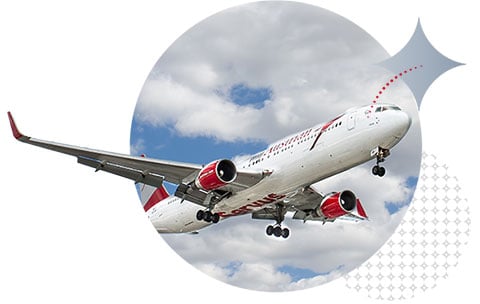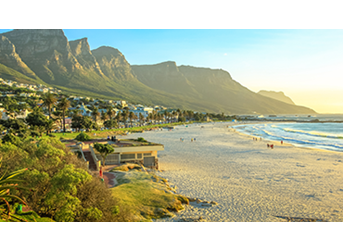How to move to South Africa
Make the most of your money for the move



Guide on moving to South Africa
8 minute readWith its awe-inspiring natural environment, temperate climate and booming services sector, South Africa has long been a popular choice amongst British citizens looking to live abroad. An estimated 200,000 British citizens have chosen to live in South Africa, with the majority living in Johannesburg, Pretoria, and Cape Town.
As is the case when emigrating to any country, there is a series of processes that you’ll be required to follow. We’ve put together this in-depth guide on how to make the process of emigrating to South Africa – whether you’re moving for career reasons or looking to purchase a house in South Africa – as smooth and as simple as possible.
How to become a resident in South Africa
The vast majority of those intending on moving to South Africa start by applying for a temporary residence visa. Temporary residence visas give holders the right to live and work in the country for between three months and five years. Those who have held a work visa for five years are eligible to apply for a direct permanent residence permit.
Applications for temporary visas are processed by the foreign offices of the Department of Home Affairs. As a British expat, you are welcome to apply for the following temporary residence visas and permits:
- General Work Visas – these are issued to foreigners in cases where it has been shown that citizens with the relevant skills are not available in South Africa
- Critical Skills Work Visas – these are for foreign nationals with exceptional skills and qualifications. Eligible skills are those that the local Ministry of Home Affairs considers to be in short supply. This is not a visa for work-seekers; all applications must be accompanied by an offer of employment from verifiable South African employers.
- Intra-Company Transfer Visas – these allow foreign workers to live in South Africa and work for a local branch of their current employer
- Business Visas – these are for businesspeople looking to establish a base in South Africa or invest in local businesses. At least 60% of your total staff must be citizens or permanent residents of South Africa. Applicants are required to present a thorough business plan, and they must have a minimum of 5,000,000 South African Rand (ZAR), or approximately £235,000, in available investment funds.
- Retired Person’s Visas – these are for individuals retiring to South Africa with a monthly income (property rentals, pension payments etc) of ZAR 37,000 (approximately £1,700) or the cash equivalent over four years – ZAR 1,776,000. This is granted for four years and can be renewed indefinitely for four-year periods.
- Study Visas – these are for foreigners looking to enrol in studies in South Africa. There is no option to apply for permanent residency with this visa.
Types of permanent residence permits in South Africa
Applying for permanent residency has a turnaround time of 8-24 months. The following permits can be directly applied for by those moving to South Africa:
- Retired Person’s Visas – these are for individuals with a proven monthly income of ZAR 37,000; providing a capital sum equal to this income over four years is not sufficient here. Unlike the temporary visas for retired people, the permanent retirement visa allows residents the same rights and privileges as South African citizenship, including the right to vote.
- Financially Independent Visas – these are for high-net-worth individuals. Applicants must have more than ZAR 12,000,000 (approximately £550,000) in assets. There is no requirement to invest these funds in South Africa.
- Spouse or Life Partner Visas – foreign nationals who are married to a South African national can make application for permanent residence in South Africa, provided that their marriage was concluded at least five years prior to the submission of their application.
How to apply for a residence permit for South Africa
You can apply for temporary and permanent visas in the UK, at the South African Embassy in Trafalgar Square (the High Commission of South Africa), or at a visa application centre in South Africa. Whether you apply from abroad or in the Rainbow Nation itself won’t affect the speed of your permanent residency permit application; however, temporary permits are typically processed more quickly when the application is submitted in South Africa.
Several forms of identification and documents are required, depending on the type of permit for which you wish to apply. These are few documents that those applying for permanent residence in South Africa will need to provide:
- Passport
- Passport photos (x2)
- Birth certificate
- Medical certificate (dating from within the last six months)
- Radiological certificate (dating from within the last six months)
- A South African Police Clearance Certificate
Setting up a South African bank account
If you decide to emigrate from the UK to South Africa, you’ll need to set up a South African bank account to meet your financial needs. The process is relatively straightforward, and it can be done with either a temporary or a permanent visa.
You’ll need to provide:
- A temporary or permanent residence permit
- Your passport
- Proof of address in South Africa
What currency do they use in South Africa?
The currency that is used in South Africa is the rand (ZAR), which was introduced in 1961. It is accepted as legal tender in Swaziland, Lesotho and Namibia, each of which also use their own currencies. The rand is divided into 100 cents, and note denominations include R 10, R 20, R 50, R 100 and R 200.
When immigrating to South Africa from the UK, it pays to keep a close eye on the pound to rand rate, as this will allow you to monitor fluctuations in the exchange rate and in the value of your future payments. You can even set up a rate alert from your Moneycorp account. This means that you’ll receive a notification from us via email or SMS message when the GBP to ZAR rate has reached a certain level.
Moving pets to South Africa
Pets are allowed entry into South Africa from abroad, provided that owners comply with the rules and regulations.
All dogs and cats that enter the country must have an ISO 11784/11785 compliant microchip inserted. If your pet has been implanted with a non-compliant microchip, you will need to bring the appropriate microchip scanner with you when you travel to South Africa.
You will also need to apply for a Veterinary Import Permit for your pet with the Director of Animal Health. Import permits are valid for six months.
Vaccinations for rabies and other diseases will need to have been administered fewer than 30 days before your move to South Africa, and less than one year before their import date.
Puppies and kittens between 8-12 weeks do not require vaccinations to enter the country; however, proof must be provided that the mother of the animal will need to have been vaccinated more than 30 days before (and less than a year prior to) their birth.
Cats and dogs under the age of three months don’t require vaccinations to enter the country, however the mother of the animal must have been vaccinated more than 30 days prior and less than a year before the birth.
Foreign currency exchange for moving to South Africa
Emigrating to a new country always involves having to make multiple payments to your new foreign bank account. Many high-street banks can incur fees of up to £30 for such transactions. This can add up to hundreds of pounds in fees when making multiple transfers to pay for a house in South Africa or transferring your pension overseas.
As foreign currency specialists, we are dedicated to saving you time and money on your international payments to South Africa. Our dedicated service helps you get the most out of your money by offering low transfer fees and a competitive GBP to ZAR exchange rate.
What’s the best way to move your belongings to South Africa?
The most cost-effective way to transfer your belongings to South Africa is via sea freight. However, whilst it is much less expensive than air freight, it is also significantly slower; whilst sea freight will take several weeks, cargo planes can transport your goods to your new South African abode in a matter of days. According to one estimate, it would take 16-22 days to ship your goods from the UK to South Africa, versus 1-3 days by air.
There’s no right or wrong answer here – rather, it’s a question of priorities. Would you rather economise or pay twice as much for a speedier service?
What is the education system like in South Africa?
There are several options to choose from when it comes to schooling. You can choose, as many expat parents do, to send your children to an international school, or to a private primary or secondary school; with that said, there are many excellent government-funded schools, and demand is high for places.
South Africa also offers the highest standard of university education in all of Africa, with 25 universities that offer academic and vocational study.
Take a look at South Africa’s schools by province.
Open an account to start transferring today
Discover our business solutions
Tips on making the most for your money when you emigrate
Our News Hub offers plenty of easy-to-read guidance on how to emigrate abroad.




